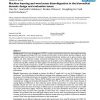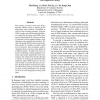9 search results - page 1 / 2 » Machine learning and word sense disambiguation in the biomed... |
BMCBI
2006
13 years 9 months ago
2006
Background: Word sense disambiguation (WSD) is critical in the biomedical domain for improving the precision of natural language processing (NLP), text mining, and information ret...
FLAIRS
2006
13 years 10 months ago
2006
The huge volumes of unstructured texts available online drives the increasing need for automated techniques to analyze and extract knowledge from these repositories of information...
BMCBI
2010
13 years 9 months ago
2010
Background: Word sense disambiguation (WSD) algorithms attempt to select the proper sense of ambiguous terms in text. Resources like the UMLS provide a reference thesaurus to be u...
ACL
2003
13 years 10 months ago
2003
A central problem of word sense disambiguation (WSD) is the lack of manually sense-tagged data required for supervised learning. In this paper, we evaluate an approach to automati...
EMNLP
2008
13 years 10 months ago
2008
The accuracy of current word sense disambiguation (WSD) systems is affected by the fine-grained sense inventory of WordNet as well as a lack of training examples. Using the WSD ex...


